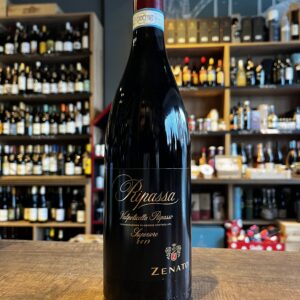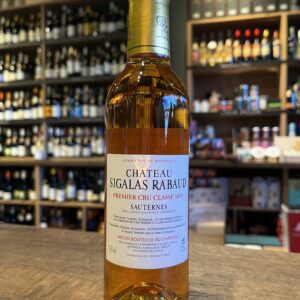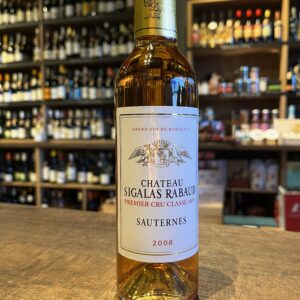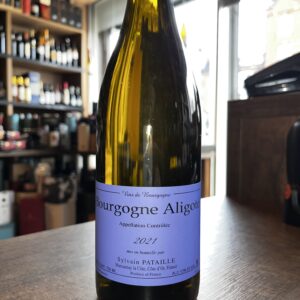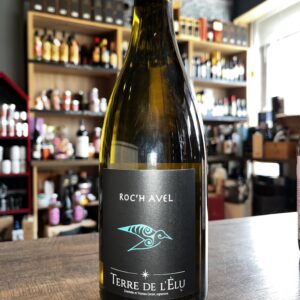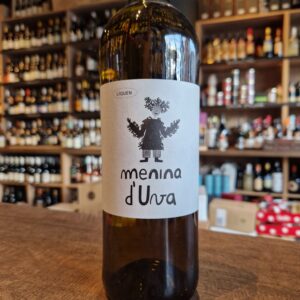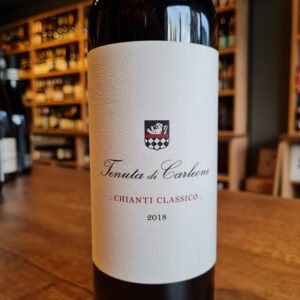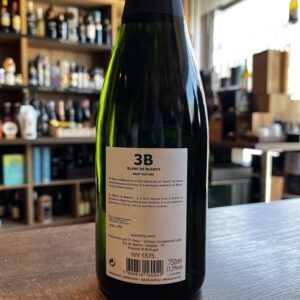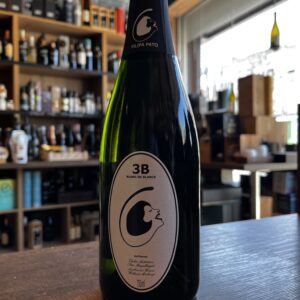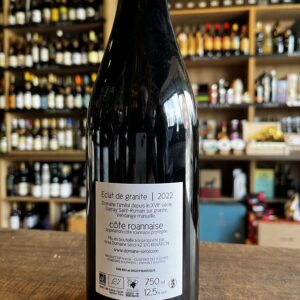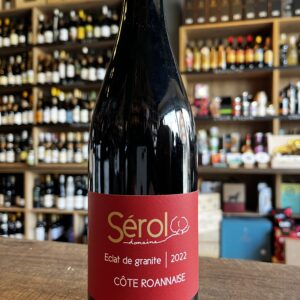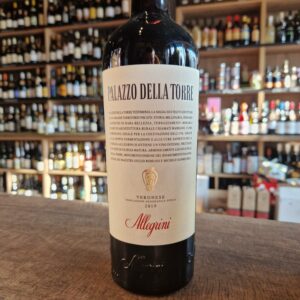-
Out of stock
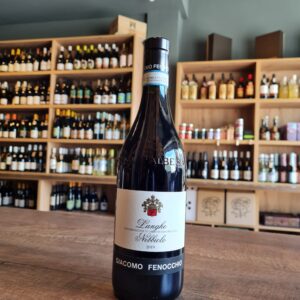 Since 1864, five generations of the Fenocchio family have been producing wine in the heart of Barolo - most of them born in the same yellow house in Monforte d’Alba, at the top of a hillside covered in Nebbiolo grapes. Claudio Fenocchio took upon his father teachings and instead of modernazing the Barolo winemaking techniques, he and with the support of his brothers decided to keep the tradition and build on it. Fenocchio has not taken up organic or biodynamic farming methods but, on the other hand, the estate never took to chemical fertilisers or herbicides, so diverse ground cover and natural predators protect the vines, which grow at their own pace. And in the winery, fermentation is similarly driven by nature and the local microflora. Technically, Claudio has found a way of producing wines which have approachable fruit when young, yet built around a strong tannic structure which does not overwhelm early on, but encourages the development of the wine over years. It is partly due to some green harvesting and careful selection, partly due to enzymatic reaction (ironically) during the long fermentation, which melds the fruit and tannin seamlessly. Barolos are aged for five months in stainless Slovenian oak and a further year in the bottle before release. steel, two years in Slovenian oak and a further year in the bottle before release. More than defining itself as traditional or modern Barolo, Giacomo Fenocchio wine is an expression of terroir.
Since 1864, five generations of the Fenocchio family have been producing wine in the heart of Barolo - most of them born in the same yellow house in Monforte d’Alba, at the top of a hillside covered in Nebbiolo grapes. Claudio Fenocchio took upon his father teachings and instead of modernazing the Barolo winemaking techniques, he and with the support of his brothers decided to keep the tradition and build on it. Fenocchio has not taken up organic or biodynamic farming methods but, on the other hand, the estate never took to chemical fertilisers or herbicides, so diverse ground cover and natural predators protect the vines, which grow at their own pace. And in the winery, fermentation is similarly driven by nature and the local microflora. Technically, Claudio has found a way of producing wines which have approachable fruit when young, yet built around a strong tannic structure which does not overwhelm early on, but encourages the development of the wine over years. It is partly due to some green harvesting and careful selection, partly due to enzymatic reaction (ironically) during the long fermentation, which melds the fruit and tannin seamlessly. Barolos are aged for five months in stainless Slovenian oak and a further year in the bottle before release. steel, two years in Slovenian oak and a further year in the bottle before release. More than defining itself as traditional or modern Barolo, Giacomo Fenocchio wine is an expression of terroir. -
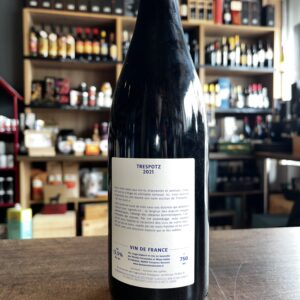
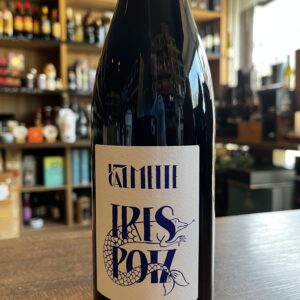 A lively and ripe juice which, in the words of Maya and Nicolas, faithfully captures the character of the wines of the commune where they are based. A very nice balance and a great drinkability for this Cahors which breaks the codes. Light and greedy at the same time, it offers us a superb length and much pleasure.
A lively and ripe juice which, in the words of Maya and Nicolas, faithfully captures the character of the wines of the commune where they are based. A very nice balance and a great drinkability for this Cahors which breaks the codes. Light and greedy at the same time, it offers us a superb length and much pleasure. -
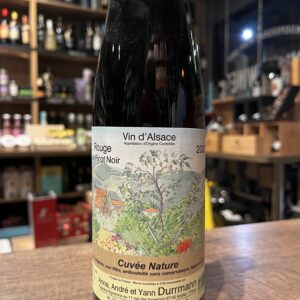 This wine is imported exclusively for Pinto Wines. The Durrmann estate is located in the municipality of Andlau, in Alsace, an ancient medieval village in which vines have been cultivated for more than a thousand years. The winery was created in 1979 with some vineyards owned by Yann's grandfather, who was a shoemaker. The lack of experience in the wine sector was a disadvantage as they had to start from scratch, but also a big advantage as they were able to immediately differentiate themselves from tradition and move towards the most natural agriculture possible with a push "of thought "very innovative. As André expanded the domain into what it is today and managed to collect a beautiful vineyard property (more than 8 hectares now), he been working completely organically since 1998, but he also applies permaculture principles to achieve the greatest possible biodiversity in the vineyards. For example, he planted trees among the grapes. He does not plow the vineyards, because he thinks that would disrupt soil life. At most he mows the grass. In winter he lets his own small flock of sheep graze the vineyards. To keep it within the vineyard, he has fenced off all his plots with mesh and fences; This also helps to keep wild boars - which appear to have a great preference for organic vineyards! - at bay. André cruises through the village in an electric car, powered by electricity he produces himself (because he refuses to use electricity from a nuclear power plant). His wife Anna cooks vegetables and potatoes on two large dishes in the courtyard that catch the sunlight and heat the pans. Anyway, you get the picture. Son Yann has now taken over the domain and more and more cuvées are now made completely naturally. Not filtered, and without added sulfite. They also still make some cuvées with sulphite, because they do not want to alienate the large private customer base that buys at the door. But most customers respond positively, so they will steadily expand the nature range. Even Rieslings from Grand Cru vineyards are now being marketed as natural wine. Taste this next to the sulfited version and you will notice that the terroir in the natural version comes out even better! Perfect at room temperature in the winter, slightly chill it in the summer. Serve with white meat or light nibbles or on its own!!Delicious and to come back for more
This wine is imported exclusively for Pinto Wines. The Durrmann estate is located in the municipality of Andlau, in Alsace, an ancient medieval village in which vines have been cultivated for more than a thousand years. The winery was created in 1979 with some vineyards owned by Yann's grandfather, who was a shoemaker. The lack of experience in the wine sector was a disadvantage as they had to start from scratch, but also a big advantage as they were able to immediately differentiate themselves from tradition and move towards the most natural agriculture possible with a push "of thought "very innovative. As André expanded the domain into what it is today and managed to collect a beautiful vineyard property (more than 8 hectares now), he been working completely organically since 1998, but he also applies permaculture principles to achieve the greatest possible biodiversity in the vineyards. For example, he planted trees among the grapes. He does not plow the vineyards, because he thinks that would disrupt soil life. At most he mows the grass. In winter he lets his own small flock of sheep graze the vineyards. To keep it within the vineyard, he has fenced off all his plots with mesh and fences; This also helps to keep wild boars - which appear to have a great preference for organic vineyards! - at bay. André cruises through the village in an electric car, powered by electricity he produces himself (because he refuses to use electricity from a nuclear power plant). His wife Anna cooks vegetables and potatoes on two large dishes in the courtyard that catch the sunlight and heat the pans. Anyway, you get the picture. Son Yann has now taken over the domain and more and more cuvées are now made completely naturally. Not filtered, and without added sulfite. They also still make some cuvées with sulphite, because they do not want to alienate the large private customer base that buys at the door. But most customers respond positively, so they will steadily expand the nature range. Even Rieslings from Grand Cru vineyards are now being marketed as natural wine. Taste this next to the sulfited version and you will notice that the terroir in the natural version comes out even better! Perfect at room temperature in the winter, slightly chill it in the summer. Serve with white meat or light nibbles or on its own!!Delicious and to come back for more -
Out of stock
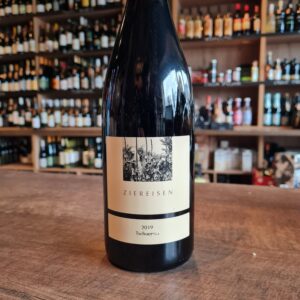 The Ziereisen winery in Efringen Kirchen in the Markgräflerland in Baden has meanwhile become an institution in its own right. Hanspeter Ziereisen originally trained as a carpenter and is therefore a real career changer who has never trained as a winemaker. His parents ran a mixed farm with pigs, cows and 0.5 hectares of vineyards. Overall, the place was characterized by part-time winegrowers who gave their grapes to the cooperative. The successor to the farm was initially uncertain, since none of the children wanted to continue it. In 1991, Hanspeter followed in his parents' footsteps with the clear goal of turning it into a winery. The small area yielded a first vintage of just 6000 bottles in 1993. Acquisitions and leases followed, and over time the business grew to today's 21 hectares. Hanspeter was interested in wine from an early age and so he tried a lot of the most interesting wines in the world. This is how he discovered his love for the red Burgundy. These are still the heart of the company today. With his style, Hanspeter Ziereisen encountered a lot of resistance. An individualist, as fellow winemakers call him, who doesn't want to produce pleasing wines, but independent ones. Spontaneous fermentation, long maceration times, long yeast storage, no filtration and the use of large and small wooden barrels - all this characterizes his style. This stubbornness or the clear definition of one's own style was also punished in the official wine testing. His wines did not fit the classic German profile and could therefore only be sold as country wines. Hanspeter Ziereisen stayed with his line and today his wines are their own brand. In the meantime a conscious decision in order to be able to design the wines in a way that corresponds to the philosophy and to be able to place the character of the wines in the foreground.
The Ziereisen winery in Efringen Kirchen in the Markgräflerland in Baden has meanwhile become an institution in its own right. Hanspeter Ziereisen originally trained as a carpenter and is therefore a real career changer who has never trained as a winemaker. His parents ran a mixed farm with pigs, cows and 0.5 hectares of vineyards. Overall, the place was characterized by part-time winegrowers who gave their grapes to the cooperative. The successor to the farm was initially uncertain, since none of the children wanted to continue it. In 1991, Hanspeter followed in his parents' footsteps with the clear goal of turning it into a winery. The small area yielded a first vintage of just 6000 bottles in 1993. Acquisitions and leases followed, and over time the business grew to today's 21 hectares. Hanspeter was interested in wine from an early age and so he tried a lot of the most interesting wines in the world. This is how he discovered his love for the red Burgundy. These are still the heart of the company today. With his style, Hanspeter Ziereisen encountered a lot of resistance. An individualist, as fellow winemakers call him, who doesn't want to produce pleasing wines, but independent ones. Spontaneous fermentation, long maceration times, long yeast storage, no filtration and the use of large and small wooden barrels - all this characterizes his style. This stubbornness or the clear definition of one's own style was also punished in the official wine testing. His wines did not fit the classic German profile and could therefore only be sold as country wines. Hanspeter Ziereisen stayed with his line and today his wines are their own brand. In the meantime a conscious decision in order to be able to design the wines in a way that corresponds to the philosophy and to be able to place the character of the wines in the foreground. -
Out of stock
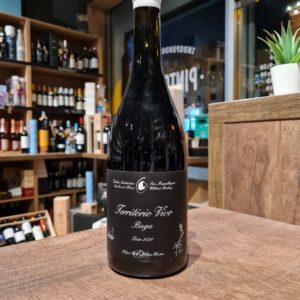 This ''Território Vivo'' is a delicate Baga, it reflects the true term ''living Terroir''. The heritage of old vineyards of the emblematic Baga grape is a richness to be relished. Some of the vines are 80 years old. The subsoils are chalky clay and the vineyards are South East oriented on fairly steep slopes. This particular vintage has fantastic story that could've gone South and thus an unforgettable harvest. They had an attack of rabbits on all of their old vines of Baga. They ate all of the grapes up to 30cm high of the ground. Inedvertently this produced high quality juice but left Filipa and William with the tiniest crops. Producing wine close to nature without pesticides and herbicides can be quite a challenge, certanly when the territory is quite alive!! Serve it with elegant glasses at the temperature of 16-18c and it is highly recommended to pair it with refined foods( not too spicy), Fillet of beef, veal, pigeon, duck and creamy cheeses.
This ''Território Vivo'' is a delicate Baga, it reflects the true term ''living Terroir''. The heritage of old vineyards of the emblematic Baga grape is a richness to be relished. Some of the vines are 80 years old. The subsoils are chalky clay and the vineyards are South East oriented on fairly steep slopes. This particular vintage has fantastic story that could've gone South and thus an unforgettable harvest. They had an attack of rabbits on all of their old vines of Baga. They ate all of the grapes up to 30cm high of the ground. Inedvertently this produced high quality juice but left Filipa and William with the tiniest crops. Producing wine close to nature without pesticides and herbicides can be quite a challenge, certanly when the territory is quite alive!! Serve it with elegant glasses at the temperature of 16-18c and it is highly recommended to pair it with refined foods( not too spicy), Fillet of beef, veal, pigeon, duck and creamy cheeses. -
Out of stock
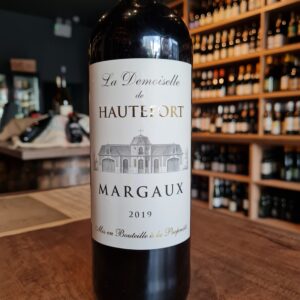 Slender and racy length, beautiful smoothness, noble freshness, very fragrant, without weakness in terms of the body and with the extension of high quality terroirs.
Slender and racy length, beautiful smoothness, noble freshness, very fragrant, without weakness in terms of the body and with the extension of high quality terroirs. -
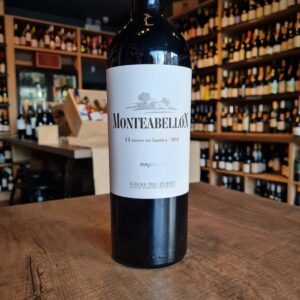 This Monteabellón 14 months is a wine made 100% with Tempranillo grapes from the highest altitude vineyards, located on sandy loam soils with clay and limestone. After a classic vinification, with 25 days of maceration, it is aged for 14 months in barrels of 70% French oak and 30% American . At Bodegas Monteabellón they use the latest oenological techniques to guarantee careful preparation throughout the process, maintaining stable levels of temperature and humidity. Smells of dark, ripe and very rich fruits. Unbelievably full-bodied and the finish is lasting and very long. This 100% Tempranillo is a complex wine that is already very enjoyable to drink, but will continue to develop splendidly over the next few years. Elegant and chocolate all over this wine. A shout to Declan & Mairead as they recommended this lovely addition to Pinto Wines!
This Monteabellón 14 months is a wine made 100% with Tempranillo grapes from the highest altitude vineyards, located on sandy loam soils with clay and limestone. After a classic vinification, with 25 days of maceration, it is aged for 14 months in barrels of 70% French oak and 30% American . At Bodegas Monteabellón they use the latest oenological techniques to guarantee careful preparation throughout the process, maintaining stable levels of temperature and humidity. Smells of dark, ripe and very rich fruits. Unbelievably full-bodied and the finish is lasting and very long. This 100% Tempranillo is a complex wine that is already very enjoyable to drink, but will continue to develop splendidly over the next few years. Elegant and chocolate all over this wine. A shout to Declan & Mairead as they recommended this lovely addition to Pinto Wines! -
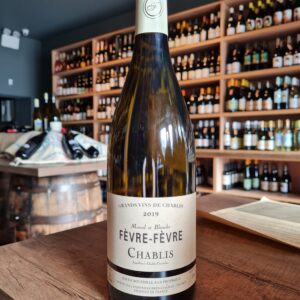 The Domaine Fèvre AC Chablis is a great place to start if you're looking to venture into wonderful world of Chablis. This wine comes from vines predominantly 15-25 years old some parcels planted in the 1950s and 1960s finding their way into the final blend. The stony soils of the region impart a fine minerality to the wine and with no oak in sight, the freshness and soft texture here are a highlight. This is Chablis 101 - sleek, fine-boned and delicious. This is great value from a family-owned domaine in the heart of the region. Is a fresh and fruity wine with flavours of white flesh fruits, like peach and pear, with citrus notes and good minerality. Pleasant as an aperitif, it makes an ideal partner for oysters, shellfish and grilled fish
The Domaine Fèvre AC Chablis is a great place to start if you're looking to venture into wonderful world of Chablis. This wine comes from vines predominantly 15-25 years old some parcels planted in the 1950s and 1960s finding their way into the final blend. The stony soils of the region impart a fine minerality to the wine and with no oak in sight, the freshness and soft texture here are a highlight. This is Chablis 101 - sleek, fine-boned and delicious. This is great value from a family-owned domaine in the heart of the region. Is a fresh and fruity wine with flavours of white flesh fruits, like peach and pear, with citrus notes and good minerality. Pleasant as an aperitif, it makes an ideal partner for oysters, shellfish and grilled fish -
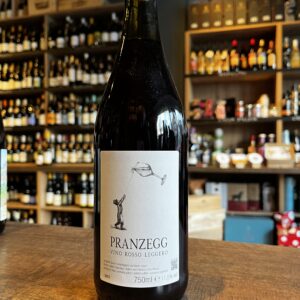 This is the kind of wine that all you need to do is to keep pouring! Delicious, joyuful, crunchy and always buy 2 as the first one will disappear. A playful and lively red that shows itself for what it is in every way: lots of fruit and some spice, a straight, agile and juicy mouthfeel, finesse, tension and elegance.
This is the kind of wine that all you need to do is to keep pouring! Delicious, joyuful, crunchy and always buy 2 as the first one will disappear. A playful and lively red that shows itself for what it is in every way: lots of fruit and some spice, a straight, agile and juicy mouthfeel, finesse, tension and elegance. -
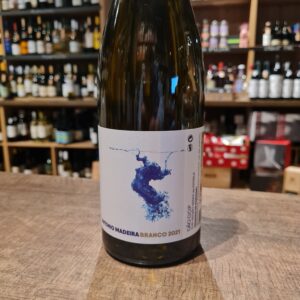
 António Madeira is a Frenchman with Portuguese roots who considers that the heart of Dão, one of Portugal’s most interesting wine regions, is in the Serra do Estrela, which is where he can trace his Portuguese roots back to. Madeira has been researching the area since 2010, and he has managed to rescue interesting vineyards with abandoned old vines growing an impressive number of native varieties. This is winemaking that dates back a long time, where the plots have special granite soils, a good altitude and sun exposure and they are cultivated with great care for the environment. All of these factors result in authentic wines, with an honest personality. An excellent return to origins.
António Madeira is a Frenchman with Portuguese roots who considers that the heart of Dão, one of Portugal’s most interesting wine regions, is in the Serra do Estrela, which is where he can trace his Portuguese roots back to. Madeira has been researching the area since 2010, and he has managed to rescue interesting vineyards with abandoned old vines growing an impressive number of native varieties. This is winemaking that dates back a long time, where the plots have special granite soils, a good altitude and sun exposure and they are cultivated with great care for the environment. All of these factors result in authentic wines, with an honest personality. An excellent return to origins. -
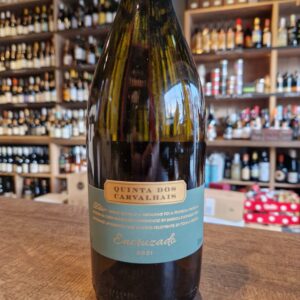 Sogrape Vinhos was founded in 1942 by Fernando van Zeller Guedes, with the ambition of making Portuguese wines known to the world and a long-term vision based on the quality of the wines to be marketed, the importance of the novelty of the brands, and the presentation of its wines. Today, led by the third generation of the founding family, Sogrape Vinhos is increasingly faithful to the goal it has had since it was founded: to be a family-owned company with an international vocation, focused on the production of quality wines, on innovation, and the development of global Portuguese brands. Sogrape Vinhos has about 830 hectares of vineyards in Portugal. Quinta dos Carvalhais is located in the municipality of Mangualde, near Nelas and Alcafache. The soil, the climate, the experience of those who have always produced wine make the Dão truly special. This 105-hectare estate, situated at an altitude of 465-500 metres, has 50 hectares under vine on predominantly granite soils. Warm days and cool nights at this altitude slow down the grape ripening process and result in wines with lovely depth yet vibrant fruit and a signature freshness. Precision viticulture is carried out on the estate with a multitude of different plots matched to specific grape varieties and harvested at different times. The fruit for the 2021 Encruzado was sourced from four different plots. Two cooler plots, one next to the lake on the estate and another often shaded by the oak trees, deliver a vibrant acidity the blend. Another plot with more sandy soils produces intensely aromatic grapes. All of the vineyards are farmed sustainably and harvesting is carried out by hand.
Sogrape Vinhos was founded in 1942 by Fernando van Zeller Guedes, with the ambition of making Portuguese wines known to the world and a long-term vision based on the quality of the wines to be marketed, the importance of the novelty of the brands, and the presentation of its wines. Today, led by the third generation of the founding family, Sogrape Vinhos is increasingly faithful to the goal it has had since it was founded: to be a family-owned company with an international vocation, focused on the production of quality wines, on innovation, and the development of global Portuguese brands. Sogrape Vinhos has about 830 hectares of vineyards in Portugal. Quinta dos Carvalhais is located in the municipality of Mangualde, near Nelas and Alcafache. The soil, the climate, the experience of those who have always produced wine make the Dão truly special. This 105-hectare estate, situated at an altitude of 465-500 metres, has 50 hectares under vine on predominantly granite soils. Warm days and cool nights at this altitude slow down the grape ripening process and result in wines with lovely depth yet vibrant fruit and a signature freshness. Precision viticulture is carried out on the estate with a multitude of different plots matched to specific grape varieties and harvested at different times. The fruit for the 2021 Encruzado was sourced from four different plots. Two cooler plots, one next to the lake on the estate and another often shaded by the oak trees, deliver a vibrant acidity the blend. Another plot with more sandy soils produces intensely aromatic grapes. All of the vineyards are farmed sustainably and harvesting is carried out by hand. -
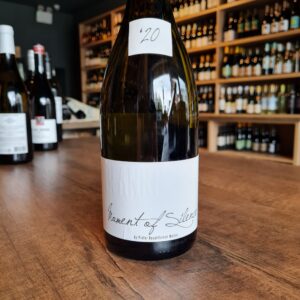 Moment of Silence is a South African wine made by superstar wine maker Pieter Walser. He buys in the fruit to make this blended wine of Viognier, Chenin Blanc and Chardonnay. It has been aged in old oak and it is a rich, powerful wine. Some of the fruit comes from vineyards which are over 50 years old.Stunning, all rounder, there is nothing you can fault in this wine. Aromas of candied lemon, cooked apple and mango with a core of minerality. Soft and voluptuous, it has a lovely ripeness and a fleshy, creamy mouthfeel, which leads to a perfect tangy freshness giving some zip to its otherwise mellow feel.
Moment of Silence is a South African wine made by superstar wine maker Pieter Walser. He buys in the fruit to make this blended wine of Viognier, Chenin Blanc and Chardonnay. It has been aged in old oak and it is a rich, powerful wine. Some of the fruit comes from vineyards which are over 50 years old.Stunning, all rounder, there is nothing you can fault in this wine. Aromas of candied lemon, cooked apple and mango with a core of minerality. Soft and voluptuous, it has a lovely ripeness and a fleshy, creamy mouthfeel, which leads to a perfect tangy freshness giving some zip to its otherwise mellow feel. -
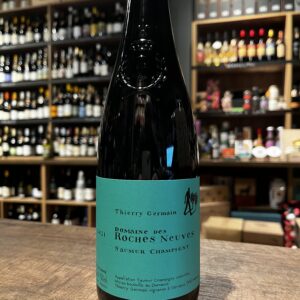 The 50-hectare Domaine des Roches Neuves is run by Bordelais Thierry Germain who originally was from Bordeaux and is situated in the appellation of Saumur-Champigny. The winery has existed since 1850, and since purchasing the estate in 1991, Thierry run it with such incredible will and tenacity that turned Domaine des Roches Neuves into one of the finest wineries/farms in France. Not to forget it wasn't without the help of his mentor and spiritual father Charly Foucault of Clos Rougeard The estate is run strictly along biodynamic lines, harvesting is manual and yields are low. This stunning wine pairs well with pork rillettes, lamb shank confit, grilled artichokes. Try it with just cheeses and charcuterie
The 50-hectare Domaine des Roches Neuves is run by Bordelais Thierry Germain who originally was from Bordeaux and is situated in the appellation of Saumur-Champigny. The winery has existed since 1850, and since purchasing the estate in 1991, Thierry run it with such incredible will and tenacity that turned Domaine des Roches Neuves into one of the finest wineries/farms in France. Not to forget it wasn't without the help of his mentor and spiritual father Charly Foucault of Clos Rougeard The estate is run strictly along biodynamic lines, harvesting is manual and yields are low. This stunning wine pairs well with pork rillettes, lamb shank confit, grilled artichokes. Try it with just cheeses and charcuterie -
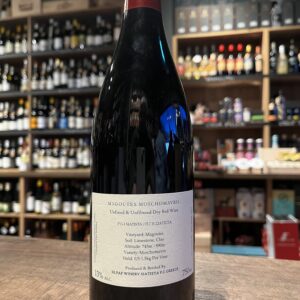
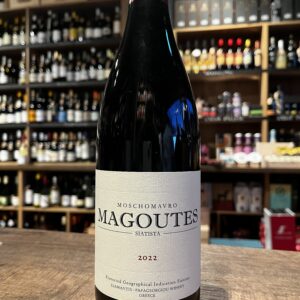 Magoutes winery, run by Dimitris Diamantis, is located in the old but forgotten region of Siatista in the mountains of northern Greece. Here vineyards have been abandoned and then revived centuries ago. The city of Siatista is nestled on the slopes of Mount Siniatsiko. The soils of the vineyards are limestone-based which adds elegance and acidity to this ruby-hued red wine. Moshomavro means 'black muscat' but is no relation in parentage or flavour! Lovers of of Beaujolais or Italian reds like pelaverga, rossesse or schiava will find a lot to appreciate in moschómavro, a variety historically interplanted with xinómavro and others in the western Macedonian mountains. Make sure to open this well in advance to get the full show, as a couple of hours of air will bring out its best qualities. It’s the ideal wine to pair with a cheese and meat board or fish. It’s also lovely with a slight chill on a warm day.
Magoutes winery, run by Dimitris Diamantis, is located in the old but forgotten region of Siatista in the mountains of northern Greece. Here vineyards have been abandoned and then revived centuries ago. The city of Siatista is nestled on the slopes of Mount Siniatsiko. The soils of the vineyards are limestone-based which adds elegance and acidity to this ruby-hued red wine. Moshomavro means 'black muscat' but is no relation in parentage or flavour! Lovers of of Beaujolais or Italian reds like pelaverga, rossesse or schiava will find a lot to appreciate in moschómavro, a variety historically interplanted with xinómavro and others in the western Macedonian mountains. Make sure to open this well in advance to get the full show, as a couple of hours of air will bring out its best qualities. It’s the ideal wine to pair with a cheese and meat board or fish. It’s also lovely with a slight chill on a warm day. -
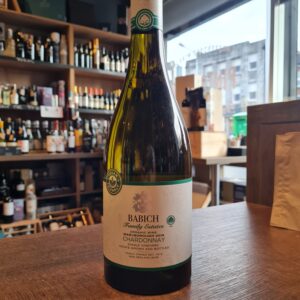 Family Estates Organic Marlborough Chardonnay; a complex style of Chardonnay grown in our Headwaters vineyard in Marlborough. The cooler climate and alluvial soils of Marlborough deliver flavour and varietal complexity that is reflective of the region and our winemaker’s commitment to sustainably crafting the most drinkable New Zealand wines in the world. This organic Chardonnay wine would go well with poultry or fish or vegetable medley.
Family Estates Organic Marlborough Chardonnay; a complex style of Chardonnay grown in our Headwaters vineyard in Marlborough. The cooler climate and alluvial soils of Marlborough deliver flavour and varietal complexity that is reflective of the region and our winemaker’s commitment to sustainably crafting the most drinkable New Zealand wines in the world. This organic Chardonnay wine would go well with poultry or fish or vegetable medley.


